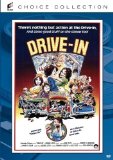| Reviews & Columns |
|
Reviews DVD TV on DVD Blu-ray 4K UHD International DVDs In Theaters Reviews by Studio Video Games Features Collector Series DVDs Easter Egg Database Interviews DVD Talk Radio Feature Articles Columns Anime Talk DVD Savant Horror DVDs The M.O.D. Squad Art House HD Talk Silent DVD
|
DVD Talk Forum |
|
|
| Resources |
|
DVD Price Search Customer Service #'s RCE Info Links |
|
Columns
|
|
|
Drive-In
Sweet, innocuous low-budget American Graffiti knock-off. Sony Picture's Choice Collection, their M.O.D. (manufactured on demand) service of old Columbia library and cult titles, has released Drive-In, the 1976 Columbia Pictures sleeper hit featuring a largely unfamiliar cast of fresh faces. Detailing one night at a small Texas drive-in where the latest Hollywood disaster movie premieres, Drive-In will seem too tame today compared to the increasingly nasty exploitation numbers that were regularly featured at ozoners back in '76, and not nearly as funny as other spoofs that were soon to come along (Airplane! would be the most obvious). However, Drive-In's low-budget raggedness and its deliberately family-friendly viewpoint is ingratiating, many of the performances are charming, the C & W soundtrack is terrific, and most importantly, Drive-In gets the feel of going to a backwoods '70s ozoner just right. No extras for this good-looking transfer.
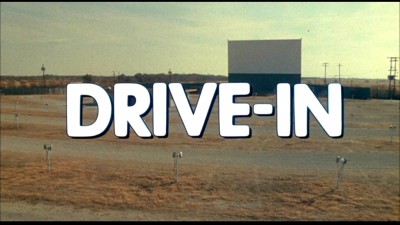
In a small Texas town in 1976, there are just two things to do when there's nothing on TV: the roller rink during the day, and The Alamo drive-in at night. Since the latest Hollywood disaster movie, appropriately titled Disaster '76, is premiering that night, the whole town will be there. Inept petty thieves Gifford (Trey Wilson) and Will Henry (Gordon Hurst) will be there, because they plan on robbing the cash box from the manager (Louis Zito) and his shapely cashier (Linda Larimer). Quiet, sensitive, ginger virgin Orville Hennigson (Glenn Morshower) will be there, with his over-sexed 12-year-old brother, Little Bit (Gary Cavagnaro). Sweet-as-cherry-pie Glowie Hudson (Lisa Lemole) will be there, because she's asked Orville to meet her, seeing as she's tired of her creepy, violent boyfriend, gang leader of The Widow Makers, Enoch (Billy Milliken). All-American stud Bill Hill (Kent Perkins) will be there, because he plans on asking steady Mary Louise (Ashley Cox) to marry him, since he bought a stolen ring from Gifford and Will Henry. As the radio plays the best of George and Tammy and the Statler Bros., the action off the screen is far more exciting than anything on it at The Alamo.
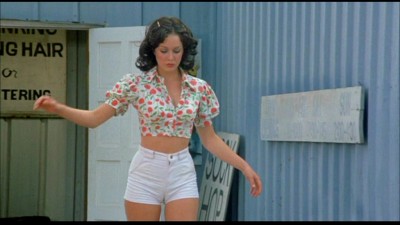
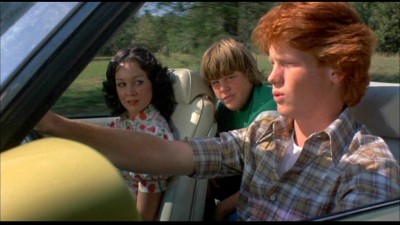
I'd be lying if I didn't start out by writing I was just a tad, just a bit disappointed with Drive-In, but only because I had built it up in my mind so much since the last time I saw it...which was exactly 36 years ago when it premiered at one of my local drive-ins. A title that's always stayed with me over the years (and a movie which no one I've spoken to seems to remember―which is always more fun), I somehow recalled Drive-In as a lot funnier and a lot sexier than it played last night on DVD (maybe because I've been staring at that promising one-sheet poster in my office for years). It's a cliché, but memory is funny that way (to a dopey 10-year-old kid in the mid-70s, Drive-In probably did seem pretty funny and sexy, I suppose), but what I took away from Drive-In last night was an amusing, nostalgic trip back to a time that's completely gone now, at least in my part of the country. Oh we still have a drive-in nearby (we had nine in our area in 1976)...but it's not the same experience anymore. There's no playground in front of the screen (ambulance chasers took care of that, like everything else fun in this world). The fly-specked concession stand is woefully undernourished (no egg rolls with the politically incorrect Chinese guy on the wrapper; no shredded Bar-B-Que sandwiches, no real butter for the popcorn). Alcohol is strictly forbidden, so no bottle cap-encrusted gravel, and no drunks staggering around, knocking on your window because they think it's their car (my old man would nudge me and say, "Tell them: 'Hit the road!'"). They quit grading the vehicle mounds years and years ago, so the cars sit flat now, making it impossible for the kids in the back seat to see the obviously patched screen. The stereo sound is depressingly non-scratchy/non-tinny from our own car speakers. And the movies are the same boring, mainstream ones you can catch at your neighborhood indoor theater...only they're darker and harder to see now, owing to the lights from the encroaching housing developments that surely spell this drive-in's eventual doom (and just to pour salt on the grumpy old man bitterness I'm sharing with you, the real-life theater that stands in for The Alamo featured here in Drive-In...is no more: a bank unfortunately squats there now. Because we don't have nearly enough banks, apparently).
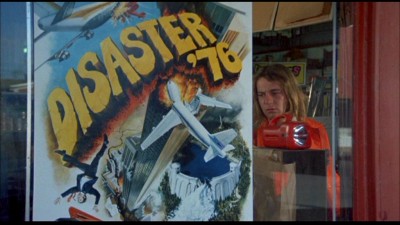
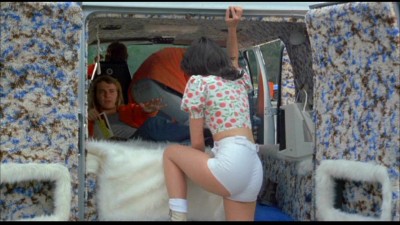
Drive-In, though, gives you a brief window onto what it used to be like going to an ozoner. Director Rod Amateau (all over the map, from absolute junk like Pussycat, Pussycat, I Love You and The Statue, to fun work on episodic TV like The Many Loves of Dobie Gillis and The Dukes of Hazzard) opens the movie with a slow, loving fly-in over farm land towards the drive-in, before he gives us various shots of The Alamo getting ready for the night's business (he'll bookend the process at the end of the film, too). Amateau nails The Alamo's milieu, and anyone who remembers going to the drive-in back then will immediately appreciate Amateau's obviously fond feel for it. Less notable is Drive-In's largely derivative script by Bob Peete (The Centerfold Girls, TV's Good Times), which, upon closer inspection, is really nothing more than a thinly-veiled knock-off of Lucas' American Graffiti, right down to a red-haired Ron Howard-look-alike protagonist (who's also sensitive like Richard Dreyfuss), a good-girl brunette Cindy Williams look-alike heroine (who's also sexually forward like Candy Clark), a awkward teen (Cavagnaro) palling around with two hoods for the night (a la Mackenzie Phillips and Paul Lemat), and some gang members, like Bo Hopkins, thrown in for good measure. The radio plays constantly over the soundtrack as in Graffiti, until the movie-within-a-movie soundtrack and the drive-in P.A. announcements take over, while the fragmented structure just replaces cruising down the main drag and Mel's Drive-In restaurant for cruising around the local roller rink and The Alamo drive-in theater.
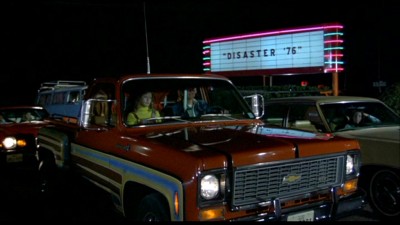
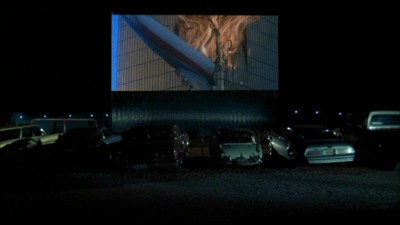
Anyone expecting Drive-In to necessarily match up with that rowdy original poster art (featured on the front of the DVD cover) is going to be disappointed, though. Drive-In's biggest plus is its loveable, shaggy dog story feel...which unfortunately is its biggest drawback, too. Peete's script starts and stops with dropped scenes and dead-end sequences (what's the deal with that trucker eluding the cops? How's that connected to the story?), with story ideas that trigger our expectations only to be ignored (why mention Mary Louise's father is the sheriff if you're not going to bring in that threat for smarmy player Bill?), and with bits that simply aren't all that funny (the whole paranoid black doctor bit isn't offensive because it's racist; it's offensive because it's not funny). And clearly, Drive-In's biggest failure is what should have been its easiest laugh: the disaster spoof main feature playing up on The Alamo drive-in: Disaster '76. I don't know if Amateau even thought of using those little snippets as fodder for parody, or if Peete simply had no idea how to spoof the genre, but those cutaways to Disaster '76 are woefully inadequate (particularly when real entries in the genre, like the previous year's Airport '75, bordered on parody already). In-between Disaster '76's old special effects stock footage of natural calamities, and Amateau's deliberately phony plastic airplanes and boats (which simply aren't funny enough in and of themselves), when the biggest laugh you can get is from someone popping their inflatable raft as a shark fin swims around it...you're in trouble.
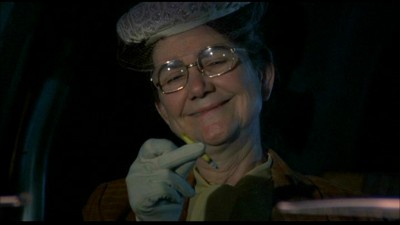
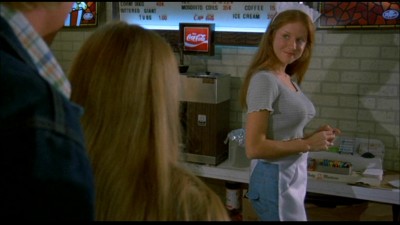
Drive-In is best, though, when it just ambles around, capturing bits and pieces of the teens' life during the build-up to the evening's show. Amateau's roller rink sequence is marvelous, with the camera right in there with all those smiling, happy kids as they jam along with the country music (at times it almost feels like a real-life documentary). And Amateau knows how to be sexy and sweetly innocent at the same time, during Orville's and Glowie's ride home from the rink, as she teases him more and more, letting him know what she wants, before kissing him full on the mouth to the delight of his younger brother (and to a nicely placed song drop of God's Gonna Get'Cha (For That)). Once everyone is at the drive-in, Peete, making sure that something is always happening as the story ping-pongs back and forth, comes up with some memorable lines, usually from the amusing robber duo ("We ain't been kids since Jesus was a lance corporal," was particularly good, and I liked the real-life biker's deadpan response to Orville's and Enoch's lame Fonzie-and-Richie punch-up: "Gang violence...it's frightening"). There's a nice bit of seriousness, too, from the Glowie character when she eventually dumps the abusive Enoch and gets with Orville (Amateau misjudges here, showing Enoch violently slapping and punching her around, momentarily ruining the cute tone of the movie)―with the understanding that's she's not anyone's prize, that's she's with Orville because he's not possessive like Enoch.
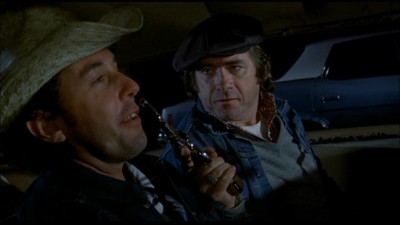
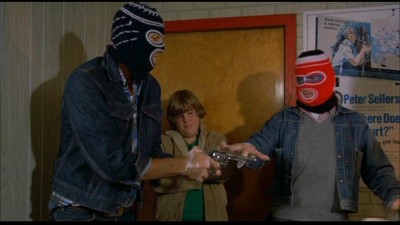
The cast of relative unknowns does fine by the material, including Hurst and Wilson as the inept robbers. Wilson, from Great Balls of Fire and Bull Durham, is probably the most familiar face here next to The Bad News Bears's Cavagnaro, who's just right as the overweight, smart-assed, horny, annoying younger brother, and he has good chemistry with the duo. Talented Lisa Lemole as Glowie is a particular standout, as well. Amateau knows the obvious: she's crazy hot in that innocent-yet-carnal "good girl" way that drives guys insane, and he's not afraid to show Lemole in all her 1976 South Texas roller rink glory: painted-on white hot pants and a too-tight cropped blouse, tottering around in skates on those long, long legs (I'm feeling faint...). But as impressive as she is sexually, she's even better with the funny lines (her "I'd rather have a non-specific disease," response to a goofy patron's ride-home offer, is the movie's best line reading), and she's spot-on with her portrayal of a pretty girl who's fed up with being used, and who wants something better in the guy she's dating (after a brief stint on Dallas, Lemole seems to have disappeared during the mid-80s, and that's a shame: she's a delight). Drive-In isn't nearly as funny as it could have been (or should have been), but its ramshackle construction and sweet disposition go a long way towards endearing it to the receptive viewer.
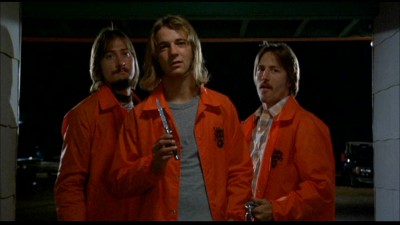
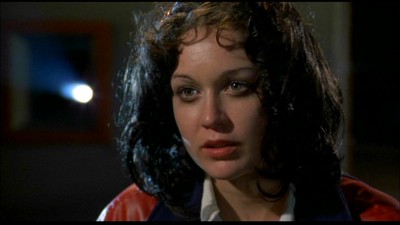
The DVD:
The Video:
The anamorphically-enhanced, 1.85:1 widescreen transfer for Drive-In looks quite good, with solid colors, a bright, sharp image, and no compressions issues to speak of. Minor print damage at the start of reels, but that's to be expected, along with lighting anomalies due to the on-the-fly cinematography from pro Robert Jessup (Race With the Devil, A Small Town in Texas, The Big Brawl).
The Audio:
The Dolby Digital English split mono audio track is just fine, with minimal-at-best hiss and a decent re-recording level. No subtitles or closed-captions.
The Extras:
No extras here for Drive-In; too bad, I remember the trailer was funny (...or am I mis-remembering that, too....).
Final Thoughts:
Towards the end of Drive-In, the theater manager comes out into the lot, throws up his hands and states, "It's never in focus!" which may be Drive-In's best line...if you grew up going to the drive-ins every week like I did. I would imagine that's going to be Drive-In's best bet for DVD sales, too―moviegoers who had that similar experience―but if you didn't, give Drive-In a try, anyway. It's rather amusing at times, and light, and it gives you an evocative peek at a way of moviegoing that's long-since gone. I'm recommending Drive-In: it's just right for summer viewing.
Paul Mavis is an internationally published movie and television historian, a member of the Online Film Critics Society, and the author of The Espionage Filmography.


|
| Popular Reviews |
| Sponsored Links |
|
|
| Sponsored Links |
|
|
| Release List | Reviews | Shop | Newsletter | Forum | DVD Giveaways | Blu-Ray | Advertise |
|
Copyright 2024 DVDTalk.com All Rights Reserved. Legal Info, Privacy Policy, Terms of Use,
Manage Preferences,
Your Privacy Choices | |||||||









